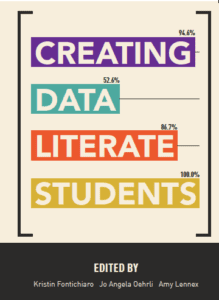 Thinking of ways to teach or integrate data literacy into your library instruction? Data literacy is defined as the ability to read, interpret, understand, and create data as information.
Thinking of ways to teach or integrate data literacy into your library instruction? Data literacy is defined as the ability to read, interpret, understand, and create data as information.
There’s an open access publication called Creating Data Literate Students (2017) edited by Kristin Fontichiaro, Jo Angela Oehrli, and Amy Lennex. Supported by the University of Michigan School of Information and University Library and funded by IMLS, this edited collection features 12 chapters written by experts and scholars who provide numerous resources, examples, and instruction plans for educators and instruction librarians to teach data and statistical literacy in the classroom. Geared toward high school students, the content can still be relevant, timely, and refreshing for first-year or new students. From showing students how to find data sets to creating infographics, readers will learn to build data literacy assignments and lesson plans across the disciplines. Here are some key takeaways from this resource:
- Peer-learning process: If there are assignments where students have to find data to support their research papers or infographics, you may want them to partner with another classmate to review their theses and data collection and address these questions based on chapter 5’s recommendations for designing an infographic: 1. Does the student have appropriate data to support their question/statement? 2. Do they have enough? 3. Do they have citations completed so readers can verify the information? 4. Can they explain the meaning of these data pieces? These questions can guide into interesting conversations for informal assessment practices, too. (p. 5).
- Questioning the source: If you are interested in applying the ACRL Frames into your lesson plan for data literacy, consider the frame: Authority Is Constructed and Contextual. In chapter 3 on using data in the research process, a sample lesson plan is shared where students were responsible for “how they analyze data when it’s presented as evidence in news sources. As a group they worked toward developing some rules of thumb for useful questions to ask when thinking about data” (p. 6). Depending on the topic of discussion, you may have students ask what questions they have about the source of data, how the data were collected, and what surprised them (p. 8). This can help students understand how data can be constructed, biased or useful depending on the context of the study. This also encourages students to build on their quantitative reasoning skills and learn how to communicate and discredit these findings.
- Using the glossary: The book also contains a glossary, which can be helpful to provide for students who are unfamiliar with these terms such as correlation, causation, cherry picking, or confirmation bias. In an exercise, you can have students think of analogies to solidify the definitions of these terms or to find articles that reflect the concepts.
This collection can also serve as a professional development resource for your academic community interested in fostering data and statistical literacy collaboratively.
- Create a faculty learning community by inviting librarians and teaching faculty who are new to data literacy to read and discuss the practices and challenges from this book. This can be an opportunity to build relations with faculty members who are interested in data literacy, services, and management through library’s efforts. This can be a great way to explore how to teach data literacy in an interdisciplinary approach with faculty coming from different departments and majors.
- Integrate the text into the course: Invite librarians and faculty who are already teaching data/statistical literacy in their classes or workshops to share ways on how to integrate selected chapters and activities into a specific course. This may work well with professors who are teaching First Year STEM, Communication Studies, Education, or First Year Math classes where students have to design infographics or find and analyze statistics for their projects. You’ll be able to hear how experts teach data research and how to build on their expertise to get more buy-in from others. In addition, this approach creates an opportunity for students to save money if they are using this open-access publication for their courses, too.
The project team also released a series of useful recorded webinars on a variety of relevant topics ranging from introduction to data literacy to how to use raw data to data presentation. These webinars can be helpful for you to guide your instructional practices in incorporating data literacy into your lesson plan!


